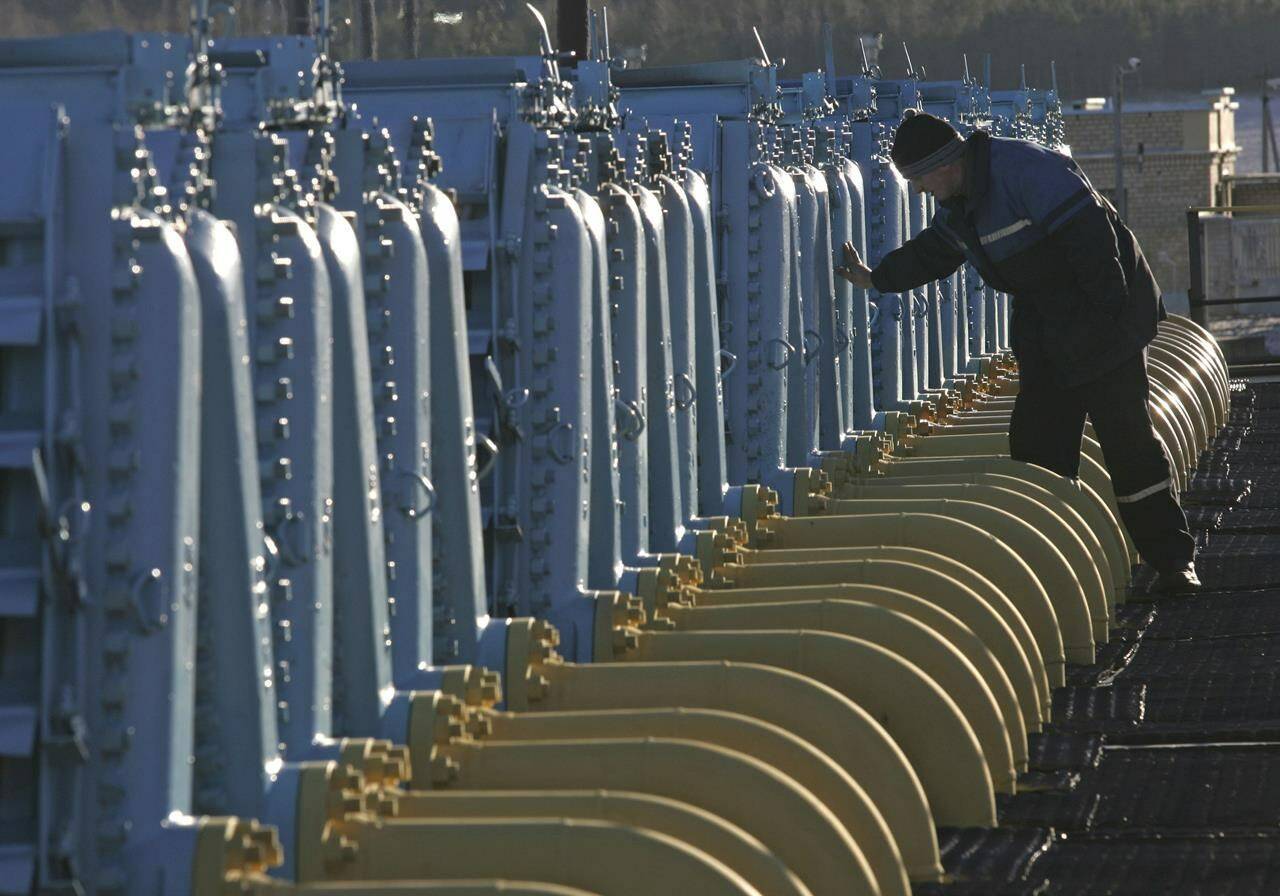Polish and Bulgarian leaders accused Moscow of using natural gas to blackmail their countries after Russia’s state-controlled energy company stopped supplying their countries with gas Wednesday. European Union leaders echoed those comments and were holding an emergency meeting on the Russian move.
The gas cutoff to Poland and Bulgaria came after Russian President Vladimir Putin said that “unfriendly” countries would need to start paying for gas in rubles, Russia’s currency, which Bulgaria and Poland refused to do.
Russian energy giant Gazprom said in a statement that it hadn’t received any payments from Poland and Bulgaria since April 1 and was suspending their deliveries starting Wednesday. And if those countries siphon off Russian gas intended for other European customers, deliveries to Europe will be reduced by that amount, the gas company said.
European Commission President Ursula von der Leyen said the announcement by Gazprom “is yet another attempt by Russia to use gas as an instrument of blackmail.”
Europe is not without some leverage in the dispute; at current prices, it pays Russia $400 million a day for gas, money Putin would lose with a complete cutoff.
Fatih Birol, the head of the Paris-based International Energy Agency, described Russia’s move as a “weaponization of energy supplies,” adding that it “makes it clearer than ever that Europe needs to move quickly to reduce its reliance on Russian energy.”
Russia, however, rejected the idea that it was using blackmail while warning it may halt gas supplies to other European customers if they also refuse to switch to paying in rubles.
Putin’s spokesman, Dmitry Peskov, argued that the Russian demand to switch to paying for gas in rubles resulted from Western actions that froze Russian hard currency assets. He said those were effectively “stolen” by the West in an “unprecedented unfriendly action.”
Austrian Chancellor Karl Nehemmer said he was assured recently by Putin that his country will be allowed to keep paying for gas in euros. Austria is not a NATO member and has strongly opposed sanctions on Russian energy, but supports other European Union sanctions against Russia and has called for apparent war crimes in Ukraine by Russian forces to be investigated.
Nehemmer tweeted to debunk “fake news” that Austria had agreed to pay in rubles before it could be “spread further by Russian propaganda.”
Polish Prime Minister Mateusz Morawiecki told Poland’s parliament that he thinks the suspension was revenge for new sanctions against Russia that Warsaw imposed over Russia’s invasion of Ukraine. Morawiecki vowed that Poland would not be cowed by the cutoff. He said the country was safe from an energy crisis thanks to years of efforts to secure gas from other countries.
Polish lawmakers stood and applauded when he said that Russia’s “gas blackmail” would have no effect on Poland.
During a visit to Prague, Poland President Andrzej Duda Duda said the Russian move was not a surprise and that Poland was prepared for it.
The new sanctions against Russia, announced Tuesday, targeted 50 Russian oligarchs and companies, including Gazprom. Hours later, Poland said it had received notice that Gazprom was cutting off its gas supplies for failing to adhere to the demand to pay in Russian rubles. Poland’s gas company, PGNiG, said the gas supplies from the Yamal pipeline stopped early Wednesday.
Bulgaria said Tuesday that it also was informed by Gazprom that the country’s gas supplies would end at the same time.
Bulgarian Prime Minister Kiril Petkov called Gazprom’s suspension of gas deliveries to his country “a gross violation of their contract” and “blackmail.”
“We will not succumb to such a racket,” he added.
Russia’s move raised wider concerns that other countries could be targeted next as Western countries increase their support for Ukraine amid a war now in its third month.
The Greek government was holding its own emergency meeting Wednesday in Athens. Greece’s next scheduled payment to Gazprom is due on May 25, and the government must decide whether it will comply with the demand to pay in rubles.
Greece is ramping up its liquefied natural gas storage capacity, and has contingency plans to switch several industry sectors from gas to diesel as an emergency energy source. It has also reversed a program to reduce domestic coal production.
If European nations decide not to pay in rubles, Russia can in theory sell its oil elsewhere, such as to India and China, because oil primarily moves by ship.
It has less options with gas, because the pipeline network that carries gas from Russia’s huge deposits in northwestern Siberia’s Yamal Peninsula does not connect with pipelines that run to China. And Russia only has limited facilities to export super chilled liquefied gas by ship.
Russian gas made up 45% of Poland’s overall gas usage until the cutoff. But Poland relies on coal for 70% of its energy needs, with gas only making up around 7% of the country’s overall energy mix.
Russian gas supplies to Poland already were expected to end later this year anyway. Poland has worked for many years to secure supplies from other countries.
Several years ago, the country opened its first terminal for liquefied natural gas, or LNG, in Swinoujscie, on the Baltic Sea coast. A pipeline from Norway is to due to start operating this year.
In Bulgaria, the main consumers of gas are district heating companies. Only about 120,000 households rely on gas. Bulgaria’s energy minister said his country can meet the needs of users for at least one month.
“Alternative supplies are available, and Bulgaria hopes that alternative routes and supplies will also be secured at the EU level,” Energy Minister Alexander Nikolov said.
—Vanessa Gera And Veselin Toshkov, The Associated Press
RELATED: Canada to hike oil, gas output 300,000 barrels a day to help displace Russian fuel

